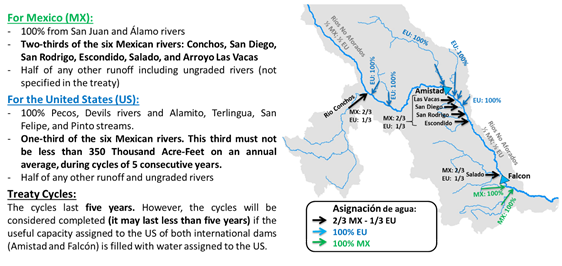Risk Analysis - Treaty 1944
ALL DATA ARE PROVISIONAL AND SUBJECT TO REVISION
Videos Related to the Treaty of 1944
- How Water is divided between the United States and Mexico, Treaty of 1944
- Is there a fixed annual amount of water deliveries from Mexico to the United States?
- The treaty of 1944 is inequitable and only benefits one country?
- Do reservoirs in Rio Conchos and Rio Salado contribute to meet the treaty obligations?
- Does the reason why Mexico receives water from the Colorado River is because Mexico delivers water from the Rio Grande/Bravo?
- Do the United States and Mexico share water and depend from each other?
- Is there a strategy of Mexico to deliver water to the U.S.?
- Does the water allocation in the Rio Grande/Bravo only benefits the United States?
- Should meeting the treaty obligations be the main water management objective and the highest priority in the Rio Grande/Bravo basin?
- Is the Rio Conchos the most important tributary because is the river that contributes the most water to the treaty obligations?
- The agriculture use is the only water users that hydrologically affect the basin?
- Does the treaty of 1944 consider the environment?
- Does the treaty of 1944 consider groundwater?
- What is the Natural hydrology of the Rio Grande/bravo?
- The Rio Grande/Bravo only has one headwater?
- Is it necessary to allocate water to the environment?
- Does the name of the Rio Grande still represent its physical characteristics?
Water availability and water supply in the Rio Grande basin depend on numerous factors related to climate conditions, storage in reservoirs and aquifers, stochastic characteristics of rainfall, water allocation policies, and other climatic variables.
This section contains a series of monthly reports that present the current conditions of the allocation of water to the United States (US) for the fulfilling the agreements established in the 1944 Treaty, including probable future scenarios if no management actions are taken and also if some management actions are taken in order to fulfill international commitments.

Monthly Reports - Cycle 35




